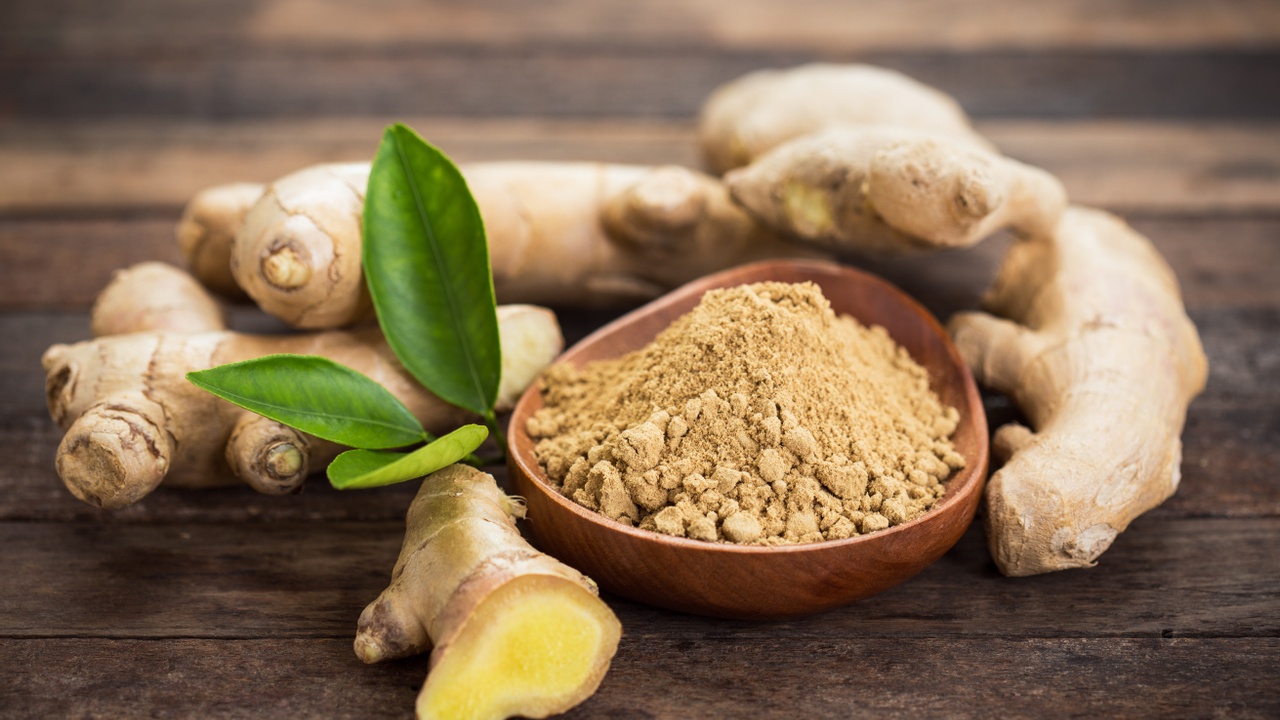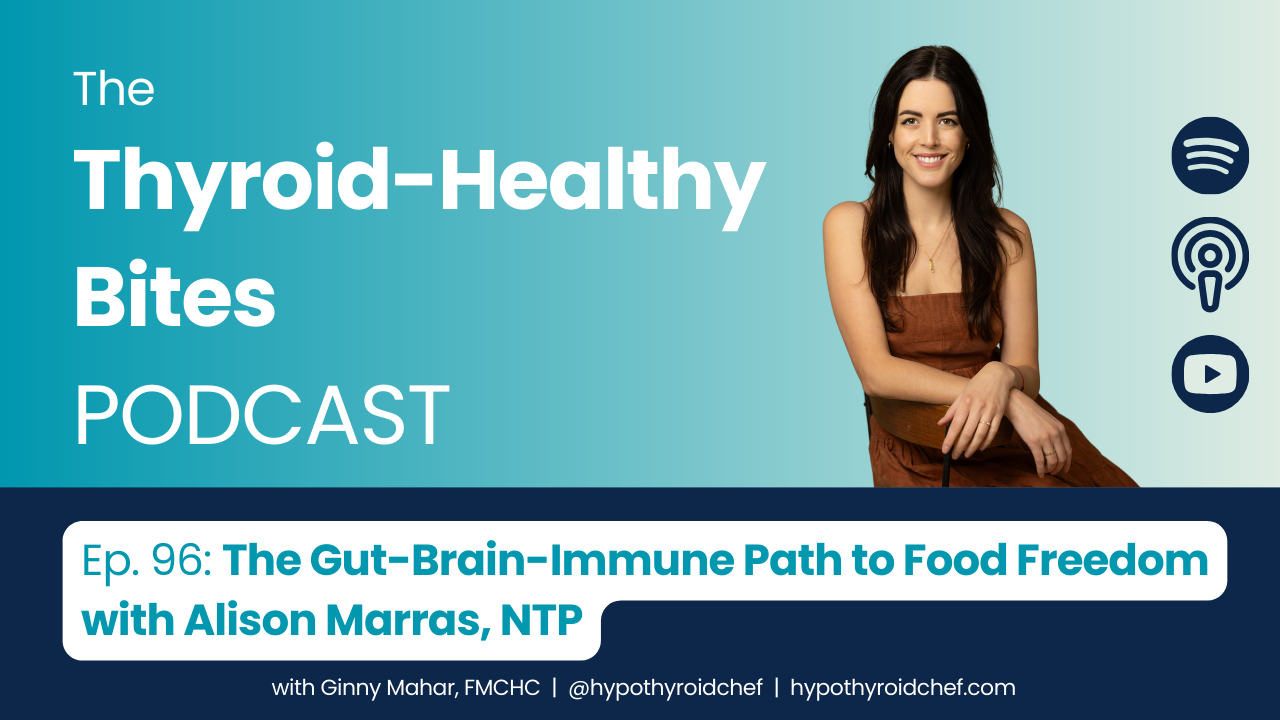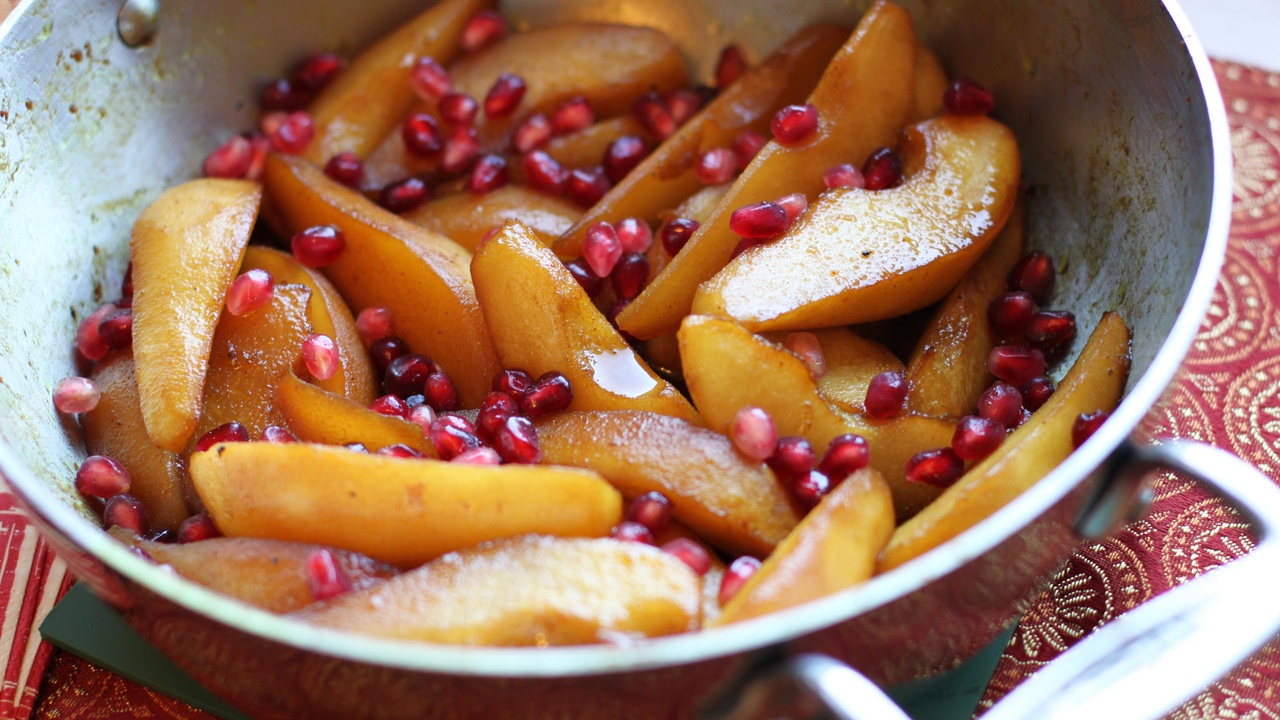Ginger: A Healing Food for Hypothyroidism?

When we think of "culinary medicine," few ingredients embody this concept quite like ginger. This tropical rhizome, with its delightful blend of sweetness and spice, can be encountered in various forms—fresh, dried, candied, pickled, in oil, as tea, or as a juice. It's a staple in numerous dishes, ranging from vibrant stir-fries to comforting soups and invigorating beverages.
For some palates, ginger's assertive flavor can take a little getting used to, while others cherish its distinct taste. But did you know that beyond its culinary magic, ginger stands out as a superstar ingredient for addressing hypothyroid symptoms like sluggish digestion, brain fog, and weight gain?
In this blog post and episode of Thyroid-Healthy Bites, we'll embark on a journey through the myriad health benefits of ginger, uncovering how it serves as a supportive ally for those of us struggling with persistent hypothyroid symptoms—even on thyroid medication and with a "normal" TSH level.
We'll Cover:
- The Holistic Health Benefits of Ginger
- Ginger's Role in Easing Hypothyroidism Symptoms
- How Ginger Boosts Metabolism and Energy
- Exploring Ginger's Impact on Hyperthyroidism
- Mastering Ginger in the Kitchen: Fresh vs. Dried Tips
- Thyroid-Friendly Recipes Featuring Ginger
So, grab a cup of ginger tea or your favorite gingery beverage, and let's explore the spice-ific benefits of ginger in this featured ingredient deep dive!
Disclaimer: This information is for educational and inspirational purposes only. Always consult with your doctor or other qualified healthcare providers before making changes to your diet, health care, or exercise regimen.
Show Notes:
Podcast Links:
- Listen on the podcast page
- Subscribe on iTunes
- Follow on Spotify
- Subscribe on YouTube
- Subscribe on Amazon Music

The ginger root that we eat is the rhizome of a beautiful tropical flowering plant in the Zingiberaceae family. Above: Ginger flowers in bloom.
The Holistic Health Benefits of Ginger
Ginger has a long and ancient culinary history with a wide range of applications. As a culinary medicine, ginger is most commonly regarded as a digestive aid, a nausea reliever, and an anti-inflammatory. It also has powerful antioxidant effects.
The main bioactive and medicinal compound in ginger, which also gives it that signature bite, is gingerol. But there are other compounds like shogaol, which contribute to ginger’s amazing anti-inflammatory properties.
Curiously, ginger is in the family of flowering tropical plants known as Zingiberaceae, which also happens to include one of our other most prized, anti-inflammatory, and medicinal culinary spices: Turmeric.
Ginger is used frequently in Chinese Medicine. According to herbalist, acupuncturist, and author Marc Ryan, ginger, “promotes sweating, is an antitoxin, is a good antidote for seafood poisoning (one reason why it’s served with sushi), benefits the lungs and stomach, and it expels pathogens.” He goes on to cite its use as an arthritis treatment and a possible cancer suppressant.
Other research-backed benefits of ginger include lowering blood sugar (and other diabetic risk factors), reducing menstrual pain, improving brain function, and fighting infection.

These Ginger Scallion Meatballs feature a one-two punch of ginger in both the meatballs and the Miso Carrot Dip!
Ginger's Role in Easing Hypothyroidism Symptoms
There's no doubt about it. Ginger is a culinary powerhouse for anyone eating to support their health, but what can it do for us as thyroid patients? Let's take a closer look.
Ginger has several benefits that address common thyroid patient woes:
- Anti-inflammatory
- Boosts metabolism
- Supports weight loss
- Promotes digestion
- Prevents constipation
- Stimulates bile flow
- Fights infections
- Improves brain function
- Reduces cholesterol
But how much of an impact can it really make? As it turns out, a significant one!
In 2022, a study was published entitled "Efficacy of Ginger Supplementation in Relieving Persistent Hypothyroid Symptoms in Patients with Controlled Primary Hypothyroidism." In simple terms, the researchers were looking to see if ginger made a meaningful impact on those pesky symptoms that thyroid medication often leaves behind. This is the case for at least 15% of thyroid patients (although my gut feeling is that this number is actually much higher).
The study looked at 60 adult hypothyroid patients with "normal" TSH levels, half of whom were given 500 mg of ginger twice a day and half of whom were given a placebo. They found that ginger led to "significant improvements" in several textbook hypothyroid symptoms, including weight gain, cold intolerance, dry skin, constipation, memory loss and concentration disturbance (or what we Thyroid Thrivers often call brain fog), and dizziness. Outcomes also improved in regard to BMI, waist circumference, blood sugar, triglycerides, and total cholesterol.
Also of note was that no adverse effects were reported from those taking the ginger, highlighting the fact that ginger is generally considered safe for most people, especially as part of a balanced diet.
While the study was small and meant to gather preliminary data, these promising outcomes will hopefully warrant larger studies! To be clear, there have been many studies on ginger. A search for "Ginger" on PubMed yielded over 6,000 results, but this is one of just a few highlighting ginger's thyroid-healthy properties.
Could culinary "doses" of ginger be enough to yield similar results? Well, it's difficult to estimate how much culinary ginger equates to the concentrated capsules of pulverized and powdered ginger administered in the study. Still, if we look at it strictly in terms of measurement, 1000 mg is less than 1/4 teaspoon. We'll look more closely at the nuances of cooking with ginger below, but the takeaway is that ginger is absolutely worth incorporating into your thyroid-healthy diet.
When we consider thyroid-healthy eating in the bigger picture, two of our primary goals are eating in an anti-inflammatory way and supporting gut health. Ginger is prized and celebrated for doing both.
Best of all, ginger is delicious! As Nutritional Therapist, AIP coach, and recipe developer Kate Jay says:
I love using ginger in my AIP recipes. Not only is it a healing spice well known for bringing down inflammation, but it adds a decent kick to foods and beverages, both sweet and savory. Because it is so warming, it helps regulate our metabolism, which has a happy effect on thyroid function.
– Kate Jay
That metabolic boost is something many of us with underactive thyroids are looking for: more energy, better digestion, and regular bowel movements. There are several reasons ginger can help keep our metabolic engines humming. Let’s look at the ways it supports digestion throughout the digestive tract.

This Lemon Ginger Honey is a wonderful home remedy for sore and scratchy throats, and makes a great homemade gift!
Igniting Metabolism: How Ginger Boosts Energy
In his book, The Hashimoto’s Healing Diet, Marc Ryan explains that ginger can be specifically helpful to those with Hashimoto’s, who commonly struggle with low stomach acid. Low stomach acid can make it hard to absorb and assimilate vitamins and minerals from our food and can also affect bile flow.
He writes, “Ginger is the perfect remedy for both problems since it promotes the release of gastrin, which is responsible for the release of stomach acid and helps promote bile flow.
As the food moves past the stomach, ginger continues to “make waves” further down the digestive tract.
According to registered dietitian Caitlin Beale, “Ginger is good for constipation because it is pro-kinetic, meaning it improves gastric motility.” In other words, it helps the food move through your digestive tract faster.
Studies have shown that ginger also improves gastric motility by supporting gastric emptying, meaning the emptying of the stomach.
Overall, ginger's ability to stimulate digestive enzymes, reduce inflammation, accelerate gastric emptying, alleviate nausea, promote gut health, and provide anti-spasmodic effects collectively contribute to its support for digestive health. When we digest better, we get more nutrients from our food, we metabolize better, our liver works better, our hormones are more balanced, our blood sugar is more balanced, we're less inflamed, our cells are happier, and together, all of that equates to better health and energy!
Exploring Ginger's Impact on Hyperthyroidism
While slow metabolism, slow digestion, and constipation are common among hypothyroid patients, what about patients dealing with hyperthyroidism? Is gastric motility or a speedier metabolism something hyperthyroid patients want? Well, maybe not.
First, let's clarify some confusion about whether we are actually hypo or hyperthyroid. Many of us who start out in the hyper camp, diagnosed with hyperthyroidism or Graves Disease, end up in the hypo camp as we get farther along the treatment path.
For example, just because you’ve been diagnosed with Graves’ Disease (autoimmune hyperthyroidism), it doesn’t necessarily mean you are currently hyperthyroid— especially if you’ve had a thyroidectomy or RAI treatment. As thyroid expert Mary Shomon puts it, “Most treatment roads lead to hypothyroidism.”
To clarify, you are hypothyroid if:
- You are taking supplemental thyroid hormone (i.e., Levothyroxine, Nature-throid, Armour, Synthroid, etc.).
- You’ve been diagnosed with hypothyroidism or autoimmune hypothyroidism (Hashimoto’s).
- You had your entire thyroid removed due to thyroid cancer, goiter, nodules, or Graves’ Disease/hyperthyroidism.
- You had part of your thyroid surgically removed for any reason and now take thyroid hormone replacement.
- You had Radioactive Iodine treatment (RAI) for Graves’/hyperthyroidism and now take thyroid hormone replacement
All that said, if you are in an actively hyperthyroid state and struggling with symptoms like weight loss, diarrhea, chronic hunger, and other signs of an over-revved metabolism, you may need to use moderation with ginger root due to those metabolism-boosting properties.
This Ginger Basil Chicken Salad is one of our household favorites in the warmer months.
Mastering Ginger in the Kitchen: Fresh vs. Dried Tips
For culinary use, ginger is typically called for in these forms:
- Fresh ginger root, either grated, minced, or sliced into coins
- Dried or powdered ginger root
- Candied ginger
Candied ginger is high in sugar and should be used sparingly, but it is also really, really tasty. It's a star ingredient in my Ginger Basil Chicken Salad, one of our household favorites in the warmer months.
For thyroid-healthy cooking, either fresh or dried ginger is ideal. While the drying process does create some chemical changes, both forms retain plenty of health benefits.
Whether to use fresh or dried ginger depends mostly on what you’re making. Dried ginger is typically used for baked goods, while fresh is used for savory dishes like stir-fry and curries.
Chef's Tip: Use fresh ginger for cooking, dried ginger for baking.
To some degree, fresh and dried ginger can be used interchangeably, but both flavor profile and texture vary.
Fresh ginger is fibrous and needs to be either grated or cut across the grain, and then julienned or minced to avoid tough, woody bits in your food.
This is one reason why dried ginger is preferred for baked goods, as the powdered form mixes easily into batters and doughs. Dried ginger is easy to use, easy to store, and adds a wonderful aromatic sweetness to baked goods.
Fresh ginger is brighter and more fiery on the palate. While you can substitute dried ginger for fresh in your cooking, the flavor won’t be quite as bold.
Rule of Thumb: 1/4 teaspoon ground ginger = 1 tablespoon fresh ginger
To Peel Ginger: Give your fresh ginger root a good rinse, and use the edge of a small dinner spoon to peel the papery husk. This is by far the most effective tool for peeling ginger.
Storage Hack: Keep a stash of fresh ginger in the freezer. Fresh ginger can be stored in the freezer for months and grates beautifully (and more easily) when frozen.
Gingery Beverage Options
For beverages, both fresh and dried ginger can be utilized. When steeped in hot water with a touch of honey, grated fresh ginger can be sweet, soothing, and spicy. Or, keep a batch of this Lemon Ginger Honey on hand.
Fresh ginger can also be blended into smoothies and whole-fruit juices like this Cranberry Zinger. In our warm and creamy Golden Milk Tea, on the other hand, the more muted spice of dried ginger is the preferred option.
Pin it for Later:

Thyroid-Friendly Recipes Featuring Ginger
- Ginger Scallion Meatballs with Miso Carrot Dipping Sauce
- Ginger Basil Chicken Salad
- Lemon Ginger Honey
- Egg Roll in a Bowl (Thyroid-friendly Version)
- Red Lentil Rainbow Soup
- Creamy Carrot Coconut Soup
- Thai Chicken Soup
- Sesame Carrots with Kasha
- Cranberry Zinger
- Brown Rice Salad with Shrimp and Avocado
- AIP Spiced Fruit Crumble
- Butterless Butter Chicken
In Conclusion
Ginger can be very helpful to thyroid patients as an anti-inflammatory food with high antioxidant properties. In addition to several other healing properties, ginger can help aid digestion, boost metabolism, and combat constipation. For hypothyroid patients, it’s clear that ginger is worth a place in your thyroid-healthy kitchen. Hyperthyroid patients, however, may need to consume ginger in moderation to avoid unwanted stimulating effects to digestion.
As Thyroid Thrivers, getting to know these featured ingredients can inform our food choices and support our health. Thanks for coming on this deep dive into the delicious and spicy world of ginger with me! These explorations can help us understand and embrace the power of food. I hope you've enjoyed getting to know ginger's powerful potential as a healing food.
Wishing you the best of health,

P.S. If you're anything like me, when I started down the path of thyroid-healthy eating I had questions-- lots of them. What to eat? What to avoid? And HOW do I do this? I wasted a lot of time trying to piece together bits and pieces of information from blog posts, infographics, books, and podcasts. What I didn't have was a step-by-step system. A roadmap, if you will, for how to put those bits and pieces together, in a way that got me where I wanted to go. That's why I created the Thyroid-healthy Meal Plan Kickstart. It includes recipes, meal plans, instruction, and a 4-week roadmap to get you started and on your way with thyroid-healthy eating! Learn more HERE.
Sources:
- https://www.healthline.com/nutrition/11-proven-benefits-of-ginger
- https://www.ncbi.nlm.nih.gov/pmc/articles/PMC3010581/
- https://www.britannica.com/plant/Zingiberaceae
- https://www.ncbi.nlm.nih.gov/pmc/articles/PMC3253463/
- https://www.ncbi.nlm.nih.gov/pmc/articles/PMC8794674/
- https://www.hopkinsmedicine.org/health/wellness-and-prevention/ginger-benefits
- https://www.ncbi.nlm.nih.gov/pmc/articles/PMC3665023
- https://www.ncbi.nlm.nih.gov/pmc/articles/PMC3016669/
Subscribe to my free newsletter for fresh recipes & lifestyle tips, delivered weekly, and receive a free gift!
By submitting this form, you agree to receive ongoing updates from Hypothyroid Chef












